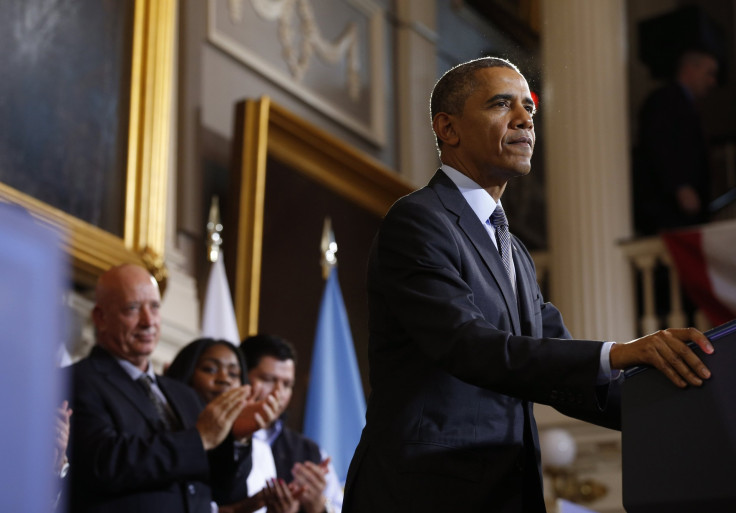Obama Allays Fears In Boston, Highlighting Progress Of Health Care Reform In The State That Set A Precedent

Today was a busy day of damage control for the new health law. Secretary of Health and Human Services, Kathleen Sebelius, apologized to a congressional hearing about HealthCare.gov’s “frustrating” yet “fixable” glitches. Soon afterwards, President Obama assured the public at Boston’s Faneuil Hall that anyone can apply for health coverage now and that the law was already making positive changes.
Massachusetts is a fitting stage for the President to talk about his signature legislation due to the State’s own successful 2006 health care law, which has served as the blueprint for the federal-level Affordable Care Act (ACA) currently being implemented. Both laws, for example, involve an insurance mandate while free insurance is available for those earning less than a percentage of the federal poverty level. “I’m confident that these marketplaces will work because Massachusetts has shown that the model works,” Mr. Obama told the crowd.
Just as important, perhaps, is Massachusetts’ ability to relate to some extent with the sluggish beginning that currently mars the ACA’s launch – albeit, without the widely scrutinized technical difficulties and partisan flak. Despite website issues, Mr. Obama pointed out that the new national marketplaces “have helped keep costs lower than…projected.” He specified that half of all uninsured Americans between the ages of 18 and 34 years will be able to purchase health insurance for less than $50 per month, which, he emphasized, is less than a cable or cell phone bill.
Mr. Obama also noted that numerous states already have had notable increases in the number of uninsured people who have now gotten insurance through the Affordable Care Act, such as Kentucky, Oregon, Arkansas, and Ohio. Yet according to an internal memo obtained by The Associated Press, the Obama administration was banking on almost 500,000 uninsured people to sign up for health insurance during its initial month — and it doesn't seem like they'll reach those goals. Medicare chief Marilyn Tavenner has already signaled a lowered expectation and told a Republican-led House committee that an exact figure would be released later in mid-November.
The president was adamant that other states that were resistant to partake in the health exchanges were misguiding their energies towards a political agenda rather than ensuring the new health law be properly carried out. One commonly echoed critique among Republicans, for example, concerns notices being sent out by health insurers to consumers, informing them that their plans were going to be terminated due to the Affordable Care Act. Mr. Obama addressed the “confusion and misinformation” about this by explaining that the law aims to put an end to “bad apple insurers” that offer seemingly good plans at exceptionally cheap rates but, in reality, provide sub-standard coverage. Instead, more robust plans will be offered at a relatively low cost and accessible through the exchanges.
Massachusetts Institute of Technology economics professor, Jonathan Gruber, pointed out in a media call that during the first month of the Massachusetts health law only 123 people signed on. This figure jumped to 36,000 when penalties for not having health insurance were about to take into effect. Gruber has advised Mitt Romney, who was Massachusetts governor in 2006, and Mr. Obama on their respective health care laws.
“We’ve covered two-thirds of our uninsured citizens. We’ve lowered premiums in the individual market. And we have a widely popular law, with about two-thirds public support for our law. That same kind of outcome will happen at the national level, but it will take time," Gruber told a White House conference call. "We need to be patient and measure the outcomes in months and years, not days and weeks."



























